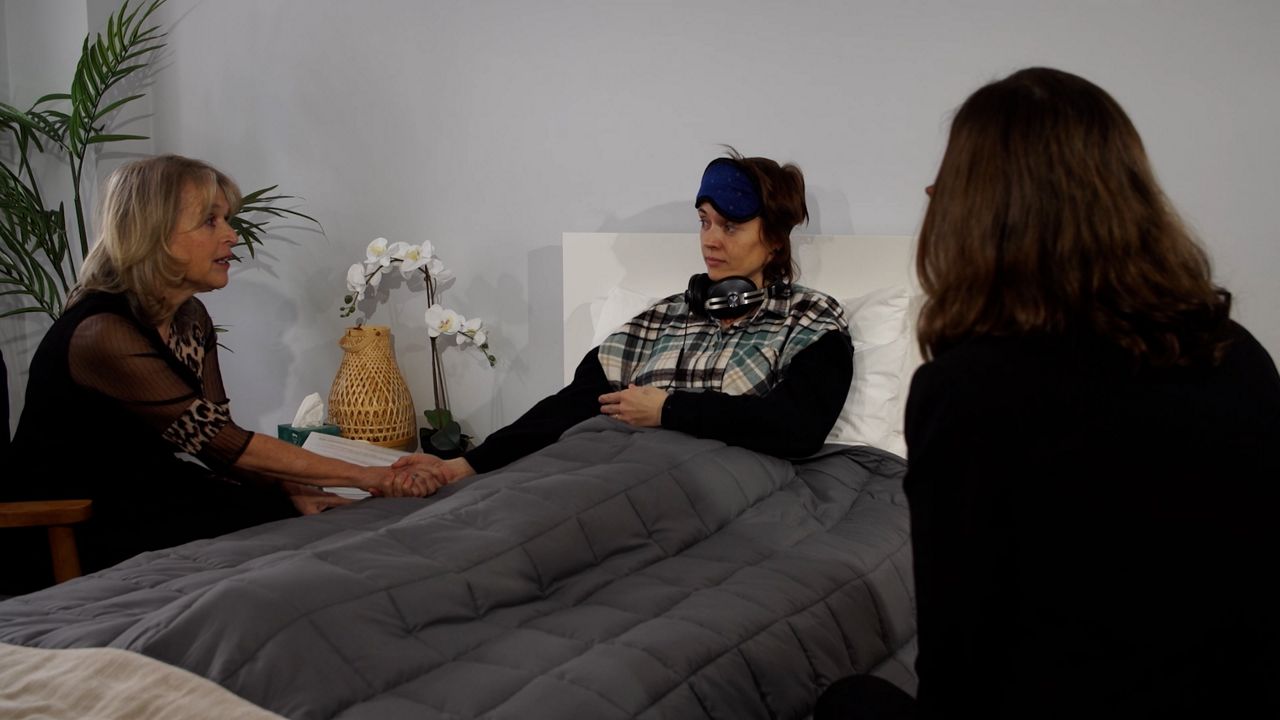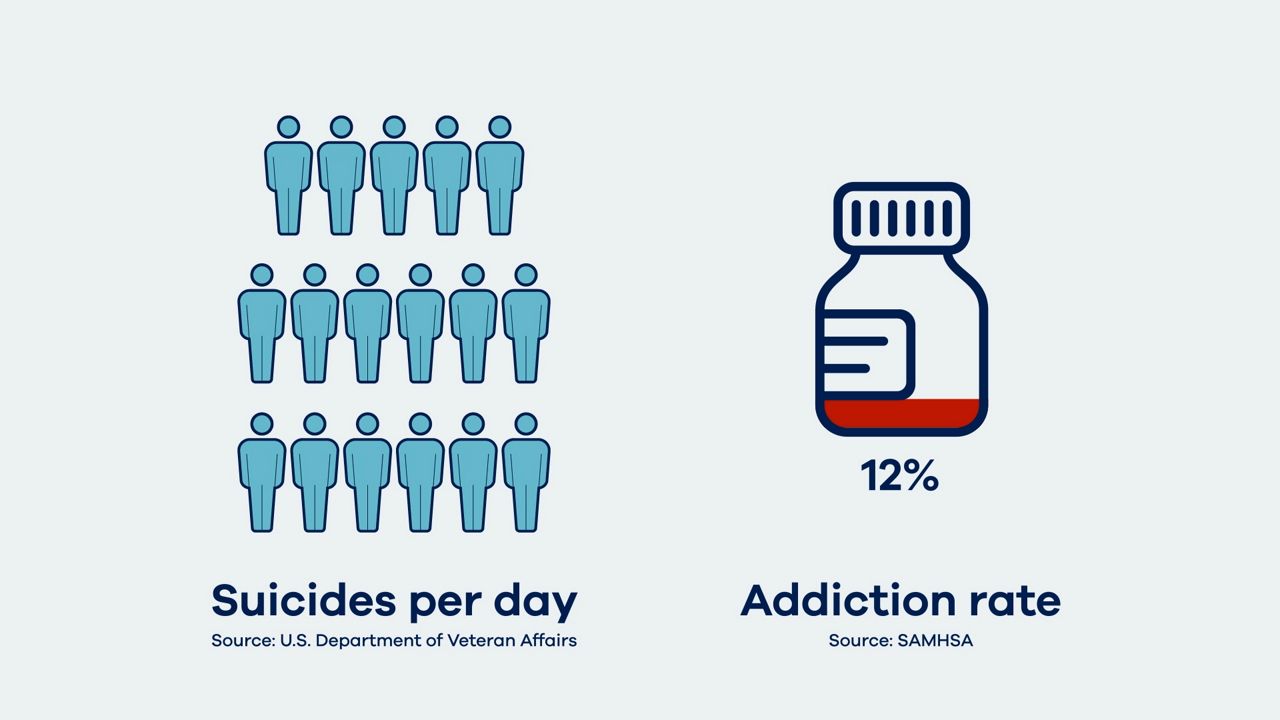
Much of the progress made in mental health treatments, particularly for post-traumatic stress disorder, has come about due to the demand for better care for the nation's military veterans.
This legacy has been continued through the push for FDA approval of the psychedelic drug MDMA.
National Health Reporter Erin Billups looks at the call for greater access in this second installment of our Exploring Your Health series on PTSD.
After serving for four years, including three combat deployments in Afghanistan, Army Ranger Jesse Gould said returning to duty was harder than he thought.
“I was excited for the next chapter to start,” Gould said. “I had this finance degree and everything the Ranger Regiment had taught me, and the confidence that came with it.”
He thought he had hit the ground running because he didn't think his service was traumatic.
“There's never been an instance where someone died in my arms, or everything just went to hell,” Gould said.
But he said he wasn't doing well. Shortly after returning to the United States, Gould began noticing symptoms that he couldn't shake.
“I was fortunate enough to see the warning signs,” Gould said. “I was just so depressed, missing work due to anxiety, panic attacks, taking medication with alcohol because I didn't know any other way to just move on to the next one. day without just struggling and suffering.”
Gould thinks his body was in shock. “Your brain has increased cortisol and increased stress because you're always alert, you're always hypervigilant,” says Gould. “You are always ready to respond at a moment's notice.”
Gould was diagnosed with post-traumatic stress disorder (PTSD). He believes his symptoms are also evidence of traumatic brain injuries from operating mortar systems and the effects of no longer being surrounded by the brotherhood of the military.
“Having these explosions near my head all the time caused inflammation, caused damage, and I had to figure this out on my own,” Gould said.
He sought help from the Department of Veterans Affairs. They offered therapy if he took selective serotonin reuptake inhibitors (SSRIs), medications typically used to treat symptoms of depression and anxiety. But Gould wanted something that could be the cause of his trauma. He saw an opportunity with psychedelic drugs.
“At first I just casually looked at it, but then it just became like, let me try this, I need something,” Gould said.
Gould quit his finance job and bought a one-way ticket to Peru. He says he found healing through shamanic sessions with the hallucinogenic drug ayahuasca.
After searching for psychedelic PTSD treatment options in the US, Jesse Gould found ayahuasca ceremonies in Peru. (Jesse Gould, Heroic Hearts Project)
“It felt like my brain was being reset. It felt like before: an engine that wasn't working properly and it felt like it was working properly for the first time in a long time,” said Gould.
Now he's on a mission to help other veterans find relief. In April 2017, he started the Heroic Hearts project, which connects veterans with PTSD with psychedelic programs in other parts of the world.
“It was just this question in my head: 'Hey, have you come across something that could potentially help a lot of people?' And that was a yes,” Gould said.
Meanwhile, the Department of Veterans Affairs has finally turned its attention to the potential of psychedelic medicine.
“I think we have a moral obligation to do what we can to advance any treatment that will help this group,” said Dr. Rachel Yehuda. A professor of psychiatry and neuroscience of trauma at Mount Sinai Icahn School of Medicine.
Yehuda has been treating patients with PTSD for approximately 35 years. She is currently leading a study at the VA investigating whether MDMA-assisted therapy offers a cure for veterans with the condition. Her team uses imaging to look for signs or biomarkers in the brain.
“It would be great, and I think it is possible, if we could develop a profile at the outset,” Yehuda said, “that would help us understand who is likely to be a responder or a non-responder.”
Yehuda said the drive to find cures for mental illness is often fueled by veterans.
“It's been very difficult to provide treatments for combat veterans that really stick. Veterans also have a very high suicide rate,” Yehuda said. “They often have many other problems and complications as well.”
Some doctors in the 1970s treated patients with MDMA, recognized at the time for its ability to reduce anxiety, reduce resilience and feel closer to others. It was already a popular party drug and the war on drugs had begun, leading to heavy restrictions on the use of psychedelics.
“Once you label a drug as schedule 1, which means there is a risk of harm and no potential therapeutic benefit,” Yehuda said, “it becomes difficult to make the argument that no, no, no, we still think there could be therapeutic benefits. benefit.”

Dr. Yehuda and her staff demonstrate a simulated MDMA-assisted therapy session.
Yehuda's research at the VA is funded in part by the Multidisciplinary Association for Psychedelic Studies, known as MAPS. The nonprofit has crowdsourced psychedelic research for more than two decades.
“There was a stigma, and the research slowed down and it took a long time to undo, educate and produce the data needed to help change people's minds and get them to see these as potentially useful tools,” Yehuda said.
Amy Emerson is CEO of MAPS, Public Benefit Corporation, a spin-off of the main organization.
Her team is solely focused on bringing MDMA-assisted therapy through the clinical trials and regulatory process. She says the findings so far are consistent, sustainable and promising.
“Three treatments of MDMA-assisted therapy, approximately one month apart. I measure that two months later,” Emerson said. “In their social, family, work life and all three of these functional areas, they were better able to engage, and it was measurable.”
Now that clinical trial publication is complete, MAPS PBC is applying for approval from the FDA.
If approved, that decision would come in 2024. The team has successfully worked with the American Medical Association to create a coding system that builds a framework for insurance billing.
“It is likely that more people will seek treatment. If there is a treatment that works, is available and is paid for,” said Emerson.

Although mental health issues can affect anyone, suicide and addiction rates among veterans are high.
To date, Gould's Heroic Hearts Project has helped more than 500 veterans and more than 100 military spouses travel abroad for psychedelic experiences, which he says has led to real healing in the community.
But Gould says much more needs to be done, with nearly 17 suicides a day and more than 12% of veterans trapped in addiction.
“It's ridiculous that veterans have to go to other countries to get life-saving mental health care,” Gould said.
Heroic Hearts advocates for broader access to psychedelic substances in the US, both within the medical system and through decriminalization, especially for veterinarians.
Gould said that as things stand now, only those with the right doctors or connections have access to psychedelics.
“This kind of, I think, monopolizing the way you can heal,” Gould said. “It's not about actually thriving and doing well in life.”
Yet scientists like Yehuda and Emerson find comfort in the clinical approach, citing its safety.
They all agree on one point: once access to psychedelic drugs is granted, there is the potential for greater societal healing.
“Trauma actually doesn't just affect an individual person. It's like it goes up from there, it affects them and then their family and then it affects their community and then it affects the way they interact with the staff,” said Emerson. “So starting to heal someone's trauma will also have that ripple effect.”
If FDA approval is granted, MDMA will need to be rescheduled so that it can be legally accessed by patients. Work is also underway at the same time to find access to psychedelics for compassionate use. However, the world is not waiting for governments to grant access. As drug use increases, public education and support for harm reduction is desperately needed.













